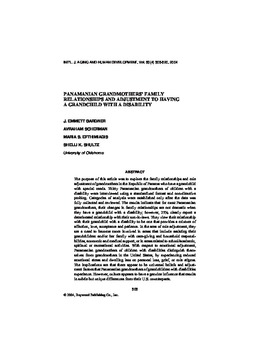| dc.contributor.author | J. Emmett Gardner | |
| dc.contributor.author | Avraham Scherman | |
| dc.contributor.author | Maria S. Efthimiadis | |
| dc.contributor.author | Shelli K. Shultz | |
| dc.date.accessioned | 2016-01-14T19:53:57Z | |
| dc.date.accessioned | 2016-03-30T15:31:37Z | |
| dc.date.available | 2016-01-14T19:53:57Z | |
| dc.date.available | 2016-03-30T15:31:37Z | |
| dc.date.issued | 2004-12-01 | |
| dc.identifier.citation | Gardner, J. E., Scherman, A., Efthimiadis, M. S., & Shultz, S. K. (2004). Panamanian Grandmothers' Family Relationships and Adjustment to Having a Grandchild with a Disability. The International Journal of Aging and Human Development, 59(4), 305-320. doi: 10.2190/l60r-mf1n-98av-tmv3 | en_US |
| dc.identifier.uri | https://hdl.handle.net/11244/25548 | |
| dc.description.abstract | The purpose of this article was to explore the family relationships and role adjustment of grandmothers in the Republic of Panama who have a grandchild with special needs. Thirty Panamanian grandmothers of children with a disability were interviewed using a standardized format and non-directive probing. Categories of analysis were established only after the data was fully collected and reviewed. The results indicate that for most Panamanian grandmothers, their changes in family relationships are not dramatic when they have a grandchild with a disability; however, 25% clearly report a deteriorated relationship with their son-in-laws. They view their relationship with their grandchild with a disability to be one that provides a mixture of affection, love, acceptance and patience. In the area of role adjustment, they see a need to become more involved in areas that include assisting their grandchildren and/or her family with caregiving and household responsibilities, economic and medical support, or in areas related to school/academic, spiritual or recreational activities. With respect to emotional adjustment, Panamanian grandmothers of children with disabilities distinguish themselves from grandmothers in the United States, by experiencing reduced emotional stress and dwelling less on personal loss, grief, or role stigma. The implications are that there appear to be universal beliefs and adjustment factors that Panamanian grandmothers of grandchildren with disabilities experience. However, culture appears to have a genuine influence that results in subtle but unique differences from their U.S. counterparts. | en_US |
| dc.language.iso | en_US | en_US |
| dc.publisher | The International Journal of Aging and Human Development | |
| dc.title | Panamanian Grandmothers' Family Relationships and Adjustment to Having a Grandchild with a Disability | en_US |
| dc.type | Research Article | en_US |
| dc.description.peerreview | Yes | en_US |
| dc.description.peerreviewnotes | https://us.sagepub.com/en-us/nam/manuscript-submission-guidelines | en_US |
| dc.identifier.doi | 10.2190/l60r-mf1n-98av-tmv3 | en_US |
| dc.rights.requestable | false | en_US |
